This post is part of series by Brookings experts on Trump’s 1st State of the Union.
At a Governance Studies event on Monday, five Brookings scholars convened to discuss what they hope to hear—and what they expect to hear—from Donald Trump’s first State of the Union address on Tuesday night. In his opening remarks, moderator E.J. Dionne noted that “This being Brookings, we will have a lot to say about policy. Arguably it may be one of the only times this week we hear about policy.” But, he added, “this presidency, as we know, is unique and it really is important to talk about the political context of this speech.”
Throughout the discussion that followed, Brookings scholars Camille Busette, John Hudak, Molly Reynolds, and Jon Valant discussed both policy and politics, and the intersection of the two. With regard to the substance of the speech, Busette predicted that Trump would focus on the economy and the decreasing unemployment rate, while failing to acknowledge that economic prosperity is not touching all Americans equally or that there are parts of the economy where jobs are not being produced. “I think he’s going to frame the economic outlook as extremely rosy,” said Busette, “and he’s going to neglect those people who are going to be central when we come to the November midterm elections.”
Acknowledging that education is not likely to be the most-talked about issue in the president’s speech, Valant suggested that he nonetheless expects the president to discuss his administration’s favorite education policy talking point: school choice. However, Valant said, he expects any such mention to be rhetorical rather than policy-specific. What Valant said he’d really like to hear is the president framing school choice “in terms of how we create opportunities for low-income kids to access schools their families can’t access.” He went on to say that he’d be very surprised but very happy if the president makes any allusion to the school-to-prison pipeline—an issue the Trump administration has said very little on.
Noting that the president was widely praised following his address to the Joint Session of Congress last February, the panelists also discussed what they expect to see in terms of the president’s style and delivery—as well as the public’s response. Valant observed that it is “not very difficult to look presidential on that stage.” Meanwhile, Hudak argued that even if Trump delivers a speech that is deemed presidential by traditional metrics, it will not take long for him to revert to more contentious behavior. “If you put on a costume on Halloween, you’re not going to wear that costume on November 1st,” he said. “And I think if the president puts on a costume tomorrow night it might get him some rave reviews, but ultimately Donald Trump is Donald Trump, and that’s what his base likes about him.” Hudak continued: “The president’s base will not like if he comes out as a more traditional politician. And I think he will hear that from Fox News and from Breitbart, and that will push him back to the Donald Trump we’ve known for the past 53 weeks and not the Donald Trump we might see in a 50-minute speech.”
No matter what President Trump says, how he says it, or how it is judged by the punditry, Molly Reynolds suggested that she’s not sure it will have much affect overall, and certainly not on the November elections. “To the extent that we have evidence of what the State of the Union typically means for public approval,” she said, “we know that sometimes the president gets a small bounce but it rarely moves the needle significantly and rarely does so for a long period of time.” She goes on to explain that is due in part to the fact that over time, the viewership of the State of the Union has become more partisan. “Now, people of the president’s party are more likely to watch the address while people who don’t identify with the president’s party are likely to turn on something else,” she said. “That means not everyone will see the speech.”
Nonetheless, the State of the Union offers an opportunity to lay out a policy agenda, and as several panelists pointed out, to serve as a launching pad for the Republican party’s midterm election strategy and messaging. Watch the full discussion, which touches on many more issues than those highlighted here, below:
For more detailed analyses and predictions related to the president’s speech, read the posts in our ongoing series, “Trump’s 1st State of the Union.”
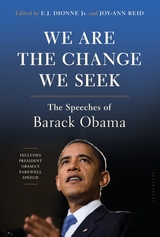
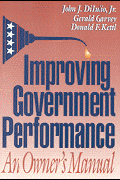


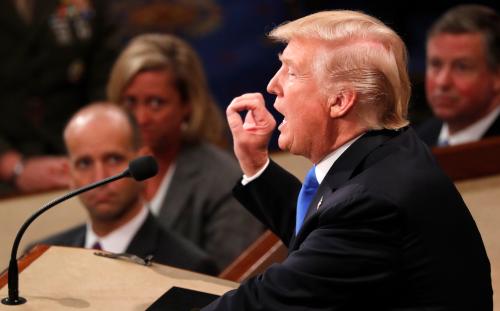
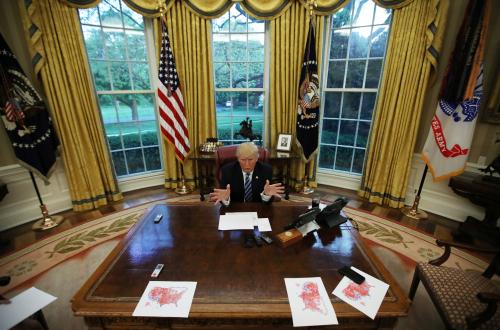

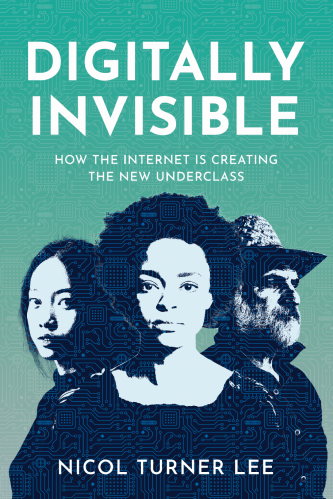


Commentary
Trump’s 1st State of the Union: Experts discuss what they expect to hear
January 29, 2018